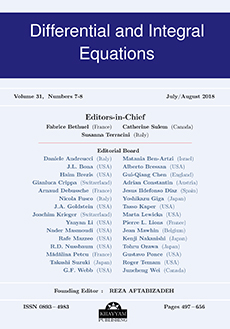Abstract
Let $\mathcal H$ denote the Hilbert transform and $\eta \ge 0$. We show that the initial-value problems $ u_t + u u_x + u_{xxx} + \eta(\mathcal{H} u_x + \mathcal{H} u_{xxx}) = 0, \, u(\cdot , 0) = \phi (\cdot)$ and $ u_t + \frac{1}{2} (u_x)^2 + u_{xxx} + \eta(\mathcal{H} u_x + \mathcal{H} u_{xxx}) = 0, \, u(\cdot , 0) = \phi (\cdot)$ are globally well-posed in $H^s(\mathbb{R})$, $s \ge 1$, $\eta>0$. We study the limiting behavior of the solutions of the first equation as $\eta$ tends to zero in $H^s(\mathbb{R})$ and $s \ge 2$. Moreover, we prove a unique continuation theorem for the first equation in $\mathcal F_{3,3}(\mathbb{R})=H^3(\mathbb{R}) \cap L^2_3(\mathbb{R})$, $\eta>0$.
Citation
Borys Alvarez Samaniego. "The Cauchy problem for a nonlocal perturbation of the KdV equation." Differential Integral Equations 16 (10) 1249 - 1280, 2003. https://doi.org/10.57262/die/1356060547
Information





